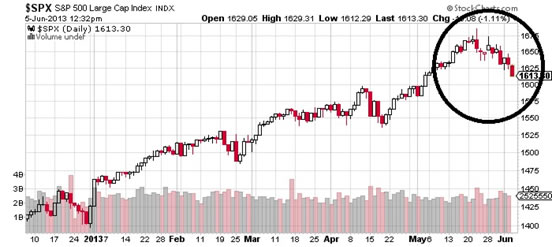Best Explanation for the Fake U.S. Housing Market Recovery
Housing-Market / US Housing Jun 06, 2013 - 04:37 PM GMT Michael Lombardi writes:
The average American Joe isn’t participating in the U.S. housing market. As a matter of fact, according to the Campbell/Inside Mortgage Finance HousingPulse Tracking Survey, investors purchased 69% of “damaged” properties in April 2013, while first-time home buyers accounted for only 16% of “damaged” purchases.
Michael Lombardi writes:
The average American Joe isn’t participating in the U.S. housing market. As a matter of fact, according to the Campbell/Inside Mortgage Finance HousingPulse Tracking Survey, investors purchased 69% of “damaged” properties in April 2013, while first-time home buyers accounted for only 16% of “damaged” purchases.
 It is very well documented in these pages how home prices in the U.S. economy are being driven upward by institutional investors. Affirming my stance on the U.S. housing market, Suzanne Mistretta, an analyst at Fitch Rating Services, was quoted this week as saying, “The [housing price] growth is being propelled by institutional money… The question is how much the change in prices really reflects the market demand, rather than one-off market shifts that may not be around in a couple of years.” (Source: Popper, N., “Behind the Rise in House Prices, Wall Street Buyers,” New York Times Dealbook, June 3, 2013.)
It is very well documented in these pages how home prices in the U.S. economy are being driven upward by institutional investors. Affirming my stance on the U.S. housing market, Suzanne Mistretta, an analyst at Fitch Rating Services, was quoted this week as saying, “The [housing price] growth is being propelled by institutional money… The question is how much the change in prices really reflects the market demand, rather than one-off market shifts that may not be around in a couple of years.” (Source: Popper, N., “Behind the Rise in House Prices, Wall Street Buyers,” New York Times Dealbook, June 3, 2013.)Major financial institutions like The Blackstone Group L.P. (NYSE/BX) have become major buyers in the U.S. housing market. Blackstone has spent more than $4.0 billion for 24,000 homes in the U.S. housing market that it plans to rent out.
Rising prices on homes in various pockets of the U.S. housing market are a direct result of large institutional investors buying in.
Take Atlanta, for example. Blackstone bought 1,400 properties worth more than $100 million in Atlanta last year. (Source: Bloomberg, April 25, 2013.) And what happened to prices for homes in Atlanta? According to CoreLogic, a housing data compiler, home prices in Atlanta increased 12.4% in the 12-month period ended February 2013, compared to a 10.2% increase in the overall U.S. housing market.
Looking forward, I don’t hold a very optimistic view on the U.S. housing market for four very specific reasons: first-time home buyers (desperately needed in any housing recovery) are missing from the action; investors who are buying homes to rent them are pushing prices higher; new homebuilder stocks are down 14% in the past month, according to the Dow Jones U.S. Home Construction Index; and long-term interest rates are moving upward!
Consider Colony American Homes Inc. This company delayed its initial public offering, which would have brought in roughly $230–$260 million, due to what the company says are “market conditions.” This company was formed last year, and it purchased homes in mid- and upscale neighborhoods in the U.S. housing market. On April 30, Colony held 9,931 homes in nine states. (Source: Wall Street Journal, June 4, 2013.)
For institutional investors, at the end of the day, it’s all about the profit; they are buying homes and renting them out all in search of a higher return on their money. But institutional buying of American homes will not sustain a recovery in the U.S. housing market.
We need the average American to be involved in the U.S. housing market because he/she provides liquidity and pushes up consumer spending. Increasing home prices right now don’t mean the U.S. housing market has recovered; actually, it’s far from it when first-time home buyers are missing from the action.
As I wrote earlier this week, something is going on in the bond market. Yields on 30-year U.S. Treasuries are spiking. (See “What the Rising Yield on 30-year U.S. Treasuries Is Telling Us.”) Rising long-term interest rates could be another death-bed for the U.S. housing market. And by the way, those homebuilder stocks that went up last year on speculation, I don’t own any of them.
Michael’s Personal Notes:
The stock market is down 500 points in just over a week…does this mean the Dow Jones Industrial Average has finally topped out?
Corporate earnings are weak; we know that. So far for the second quarter of 2013, more than 80% of the companies in the S&P 500 that have issued their corporate earnings guidance have provided a negative outlook. (Source: FactSet, May 31, 2013.)
Yes, the key stock indices have gotten ahead of themselves. In the first two months of the second quarter, the S&P 500 increased five percent; but as that was happening, earnings estimates for the quarter dropped by 3.4%!
At the end of March, analysts expected the S&P 500 companies to register an increase of 4.4% in their corporate earnings for the second quarter; now that number has dropped to a paltry 1.3%. (Source: FactSet, May 31, 2013.)
In the first quarter of 2013, companies in the key stock indices struggled with revenue growth. Only 46% of the S&P 500 companies recorded revenues above estimates for the first quarter, while the average for the last four quarters was 52%.
But there are further threats to corporate earnings. Demand is weak in the U.S. economy, as the American consumer is still under pressure—he or she is typically working at a job that pays the minimum wage (that’s where most of our jobs growth has been since the Great Recession ended), while the costs of basic necessities continue to rise in an environment where the government says there is no inflation.
I remain skeptical of the rise in the key stock indices, as they aren’t moving in line with the current business conditions in the U.S. economy. I continue to believe the bear market rally, which began in 2009, has done a great job in luring investors back into the stock market. The key stock indices are up significantly and have given investors a false hope that they will climb further.
The S&P 500 has been making lower lows and lower highs since May 22 (as you can see in the chart below), but from what I’ve read from stock advisors, they say to buy on dips—advice I’m not following.

Chart courtesy of www.StockCharts.com
What’s going on with the equity markets right now reminds me of 2007 all over again—that’s when the key stock indices were moving higher, regardless of what was happening with the economy. We are experiencing something similar to that right now, with the stock market and economy having gone in such opposite directions.
Predicting the exact point at which the top will be in for the stock market is difficult, if not impossible, but odds are we are very close.
Source -http://www.profitconfidential.com/real-estate-market/best-...
Michael Lombardi, MBA for Profit Confidential
http://www.profitconfidential.com
We publish Profit Confidential daily for our Lombardi Financial customers because we believe many of those reporting today’s financial news simply don’t know what they are telling you! Reporters are trained to tell you the news—not what it can mean for you! What you read in the popular news services, be it the daily newspapers, on the internet or TV, is the news from a “reporter’s opinion.” And there’s the big difference.
With Profit Confidential you are receiving the news with the opinions, commentaries and interpretations of seasoned financial analysts and economists. We analyze the actions of the stock market, precious metals, interest rates, real estate and other investments so we can tell you what we believe today’s financial news will mean for you tomorrow!
© 2013 Copyright Profit Confidential - All Rights Reserved
Disclaimer: The above is a matter of opinion provided for general information purposes only and is not intended as investment advice. Information and analysis above are derived from sources and utilising methods believed to be reliable, but we cannot accept responsibility for any losses you may incur as a result of this analysis. Individuals should consult with their personal financial advisors.
© 2005-2022 http://www.MarketOracle.co.uk - The Market Oracle is a FREE Daily Financial Markets Analysis & Forecasting online publication.



